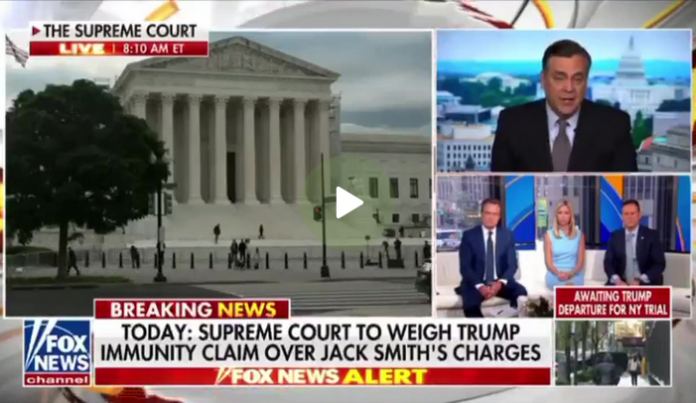In a charged Supreme Court atmosphere that could reshape legal interpretations surrounding presidential powers, former President Donald Trump’s lawyers are arguing for their client’s immunity, all while Trump himself battles charges in Manhattan.
During an interview with Fox News, legal expert Jonathan Turley discussed the potential implications of the Manhattan case on future legal standards, especially concerning the extent of criminal law’s reach over a sitting or former president. Trump’s case involves 34 counts of falsifying business records, allegedly tied to hush money payments made to pornography actress Stormy Daniels before the 2016 election. The ongoing trial has not only captured national attention but also sparked discussions about the boundaries of presidential immunity.
“I think that you’ve really captured the moment for the justices. They would love this cup to pass from their lips, but they have to drink. They’ve been avoiding this for decades,” Turley said, referencing discussions on presidential civil immunity.
The discussion around whether such immunity extends to criminal charges has been a point of contention, potentially setting the stage for “bad case law,” as Turley suggested.
The legal stakes are high, and the courtroom strategies by Trump’s legal team have been described by some observers as extreme. Turley pointed out that this approach might be a tactical response to equally severe lower court decisions, which seem to leave a president without any legal protections.
“So they’ve got cliffs on both sides. Either they go over one side and a president has no protections at all, or you go over the other side and a president has total protections, he could do most anything,” he elaborated.
WATCH:
The extreme polarization in court might lead to a middle ground, a nuanced option that provides some level of protection to a president without making it absolute. Turley hinted that the Supreme Court, known for its incremental approach, might favor such a solution.
“This is, after all, an incrementalist court. They tend to try to take small steps, not great leaps,” he said.
Meanwhile, the spectacle continues outside the courtroom as well. Trump has been vocal, critiquing the gag order placed on him as part of the proceedings. His lawyers argue that these constraints are overly broad and hinder his ability to participate in the ongoing presidential campaign.
“Alvin Bragg is probably the best lawyer Donald Trump has right now,” Turley said. According to the legal expert, the Manhattan case is “legally absurd,” coinciding with the Supreme Court’s consideration of presidential protections—a convergence that could ultimately benefit Trump.
In an attempt to prove that former President Trump falsified business records, the prosecution in his New York trial argued that the mislabeling of payments to Stormy Daniels as a “legal expense” constituted a crime. The strategy hinges on a broader interpretation of New York law, which criminalizes conspiracies to influence electoral outcomes through unlawful means.
The prosecution’s theory suggests that Trump committed a crime by orchestrating a payment to suppress a potentially damaging story, subsequently reimbursing his lawyer Michael Cohen under the guise of unrelated legal services. This prosecutorial approach aims to clarify the underlying crime supporting the indictment after previous explanations had left many puzzled over the specifics of the alleged legal violations.
